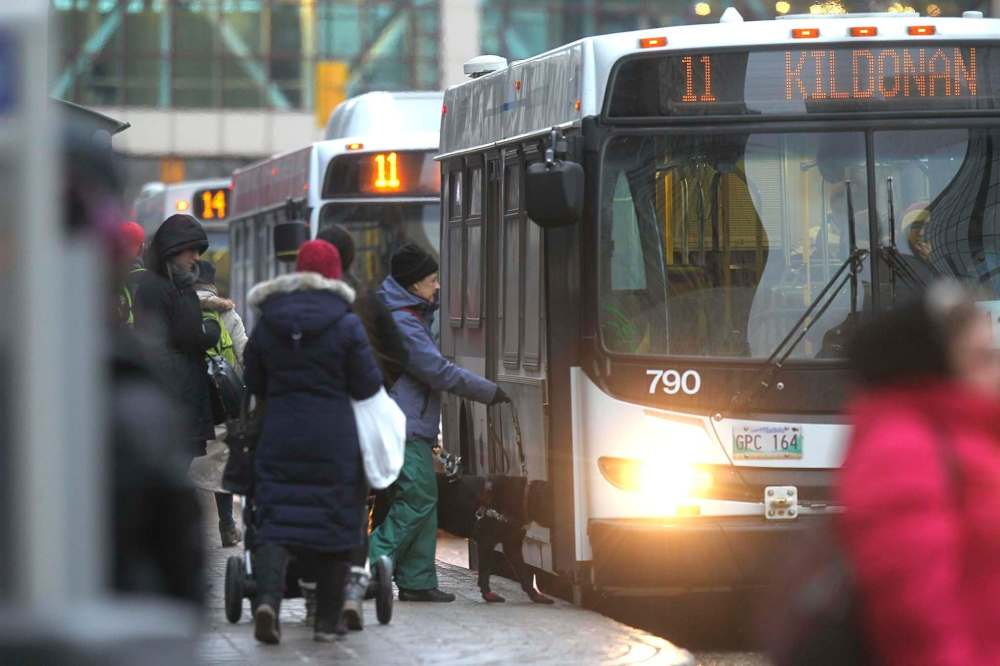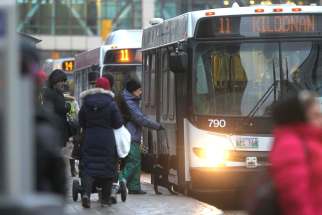Empowering Transit inspectors risky
Read this article for free:
or
Already have an account? Log in here »
To continue reading, please subscribe:
Monthly Digital Subscription
$0 for the first 4 weeks*
- Enjoy unlimited reading on winnipegfreepress.com
- Read the E-Edition, our digital replica newspaper
- Access News Break, our award-winning app
- Play interactive puzzles
*No charge for 4 weeks then price increases to the regular rate of $19.00 plus GST every four weeks. Offer available to new and qualified returning subscribers only. Cancel any time.
Monthly Digital Subscription
$4.75/week*
- Enjoy unlimited reading on winnipegfreepress.com
- Read the E-Edition, our digital replica newspaper
- Access News Break, our award-winning app
- Play interactive puzzles
*Billed as $19 plus GST every four weeks. Cancel any time.
To continue reading, please subscribe:
Add Free Press access to your Brandon Sun subscription for only an additional
$1 for the first 4 weeks*
*Your next subscription payment will increase by $1.00 and you will be charged $16.99 plus GST for four weeks. After four weeks, your payment will increase to $23.99 plus GST every four weeks.
Read unlimited articles for free today:
or
Already have an account? Log in here »
Hey there, time traveller!
This article was published 11/01/2019 (2526 days ago), so information in it may no longer be current.
What does it mean to “detain” someone? And who should be legally authorized, and who would be properly prepared, to attempt to do it?
These are questions city councillors and officials at Winnipeg Transit should consider fully before proceeding with their current effort to empower Transit inspectors to more forcefully intervene in situations involving unruly bus passengers.
On Tuesday, the city’s public works committee voted unanimously in support of a motion directing civic administration to prepare a report exploring options to expand the authority and powers of Winnipeg Transit inspectors. At issue is the current consensus among civic politicians, Transit officials and union representatives that the recently increased presence of inspectors on Transit buses has done little to improve safety, because they are essentially powerless to deal with the type of passengers who pose the greatest threat to Transit operators and other riders.
Coun. Matt Allard, who chairs the public works committee and proposed the motion, says he has been told by Transit officials and the public that “if inspectors can’t stop people, then you’re missing dealing with some of the more difficult situations.”

Since what Transit inspectors are currently authorized to do is limited to talking to unruly passengers and asking them to either cease their problematic behaviour or exit the bus, it will be interesting to see what the administrative report eventually recommends. The executive director of the Winnipeg Association of Public Service Officers (WAPSO), which represents Transit inspectors, said the intent is not to turn his members into bus-bound “bouncers” but instead would favour the use of crisis-intervention techniques aimed at de-escalating incidents.
However, WAPSO’s Keith Bellamy added, “Should things be escalating out of that scope, there (would be) the ability for people to take actions. Right now, our members… are not able to effectively do that.”
Regardless of how the descriptions are parsed, the end result seems to be authorizing Transit supervisors to physically intervene — as in “detain” — when the actions of unruly bus passengers require such a last-resort response.
The president of the Winnipeg Police Association doesn’t think that’s such a great idea. Moe Sabourin said Tuesday it’s unfair to Transit inspectors and unsafe for drivers and passengers to create situations in which inspectors are expected to respond in the same manner a police officer might.
His point is well taken, especially in light of a separate report this week that suggests the confrontations police officers face have become exponentially more dangerous in the increasingly common cases when combatants are experiencing methamphetamine psychosis. A Winnipeg Police Service spokesman said meth users confronted by police tend to be armed, usually with “edged weapons,” creating a much higher level of risk for officers seeking to de-escalate such situations or arrest the impaired offender.

Which brings us back to the current push to give Transit supervisors authority to, when extreme circumstances dictate, “detain” bus passengers who are disruptive and unwilling to heed verbal demands to cease and desist. Since it’s fair to assume that a significant percentage of abusive passengers are under the influence of a behaviour-altering substance, and since the WPS has expressed concerns about a spike in the number of armed confrontations its officers are facing, how exactly will (one assumes) unarmed Transit supervisors be trained and equipped for the inevitability of having to “detain” a disruptive passenger who turns out to be armed?
Bus safety is an ongoing concern, but one can only hope the report’s recommendations don’t risk turning Mr. Allard’s “difficult situations” into tragic ones.










